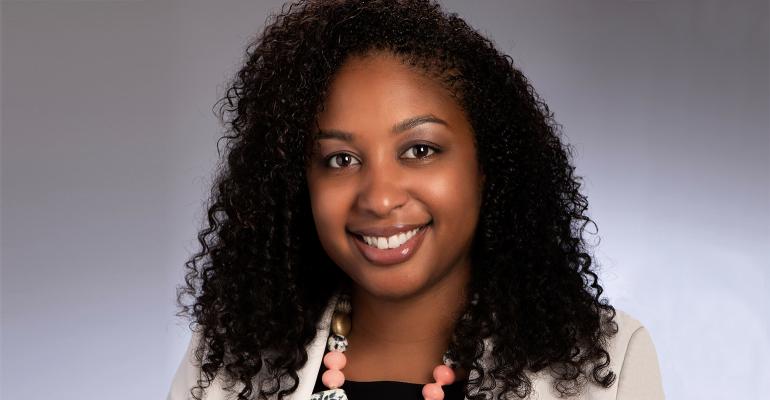As the CFP Board considers expanding the number of public members on its board of directors, new board Chair-Elect Kamila McDonnough stressed the importance of increasing the diversity of experience of those members in an interview with WealthManagement.com.
McDonnough suggested that with the rise of automated advice platforms, or so-called robo advisors, it would be helpful to have members with stronger tech backgrounds and awareness and experience with digital tools, as well as members who focus on working with different socioeconomic levels or underserved communities.
“When we have that conversation, we want to make sure from a composition perspective, there isn’t group think,” she said. “We want smart, passionate people, but we want outsiders. Those are the individuals that spark questions. It’s what helps us advance our way of thinking.”
In addition to being the first Black woman nominated as board chair-elect, McDonnough has worked in numerous channels in the financial services space, including at a large corporation, an independent broker/dealer and now as an independent advisor building her book of business as president at GRID 202 Partners.
McDonnough, who is based in Charlotte, N.C., also discussed the Board’s review of its governance and enforcement policies about how it handles disciplinary disclosures of CFP planners, as well as the Board’s revised Code of Ethics and Standards of Conduct, which was implemented on June 30.
When the updated code was first presented in 2018, wirehouses initially balked, arguing that they’d have to conform to the Board’s fiduciary standard as well as Reg BI. Some questioned whether the new standards would lead any wirehouses to abandon the designation. McDonnough said that, to date, she had not heard of any wirehouses reacting in such a way to the newly implemented Code of Ethics and Standards. If faced with a firm that was reticent about the new standards, she said she’d make the case that the code supports a firm’s ability to declare that they’re transparent.
“No one wants to spend a lot of time revising compliance procedures. But at the end of the day, it makes you a better firm,” she said. “I think if you’re a firm that’s client-first, I think there’ll be little trepidation in adopting our standards.”
The CFP Board came under increased scrutiny last summer after the Wall Street Journal reported that CFP professionals were failing to disclose disciplinary, regulatory and criminal measures on their records. The Board convened a task force that delivered its recommendations in December, and also pledged to move away from relying on CFP advisors to self-disclose past transgressions. McDonnough noted that the Board’s exponential growth was part of the issue (the number of CFP professionals increased by more than 3,000 in the past year alone, for a total of 87,276).
“You want to have such an impact that you grow so fast that sometimes you have to take a step back and ask whether the processes that were brought to the table are keeping up with our growth,” she said. “We were focusing so strongly (on growth) we didn’t ensure that the enforcement actions were continuing to scale.”
In response, McDonnough said the board of directors was bringing in more perspectives on enforcement issues.
McDonnough’s nomination comes during a period she described as an “inflection point” for the industry, as it struggles with the nation’s racial wealth gap as well as a lack of diversity among advisors. The percentage of CFP holders that were Black or Hispanic jumped slightly from 3.5% to 3.8% from 2018 to 2019, and women make up about 23% of the CFP pool, according to the CFP website. To diversify further, McDonnough stressed that the Board needs to reach individuals who forgo pursuing a career in the industry.
“I’m sure there were people who had interest in this profession that said ‘very few people look like me,’” she said. “What are the things we can do to make this industry attractive to diverse groups and women?”
McDonnough cited the CFP Pro Campaign, which she said would hopefully reach those individuals interested in the industry but wary of what the lack of diversity signified, and also cited a new scholarship created in partnership with Facet Wealth. The scholarship will offer Black candidates seeking to become CFP professionals $5,000 to help cover expenses associated with completing education requirements to get the certification. The Board plans to award as many as 20 scholarships in the next four years.
As the industry continued to wrestle with how to address the disparities in diversity among professionals and clients alike, McDonnough said her nomination as the first Black woman to eventually become board chair is a notable step forward. She said she hopes her new role might inspire CFP professionals who are women of color to consider her path as more relatable, something they in turn could emulate.
“Seeing someone you wouldn’t anticipate being Chair actually being Chair is a great experience,” she said.
McDonnough will succeed current Chair-Elect Douglas E. King in early 2022.





